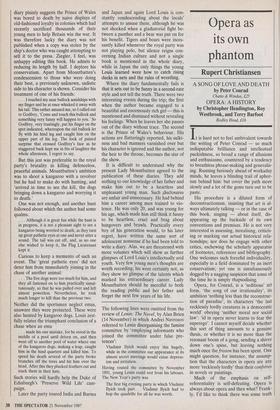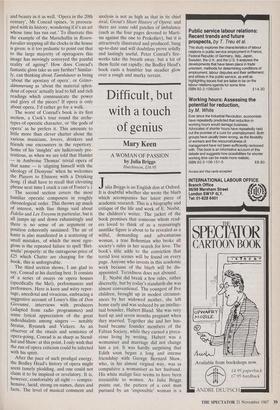Opera as its own phantom
Rupert Christiansen
A SONG OF LOVE AND DEATH by Peter Conrad
Chatto & Windus, £25
OPERA: A HISTORY by Christopher Headington, Roy Westbrook, and Terry Barfoot
Bodley Head, £16
It is hard not to feel ambivalent towards the writing of Peter Conrad — so much indisputable brilliance and intellectual puckishness, so broad a range of allusions and enthusiasms, countered by a tendency to breathless phrase-making and generalis- ing. Running furiously ahead of workaday minds, he leaves a blinding trail of aphor- ism behind him: but cover the path more slowly and a lot of the gems turn out to be .paste.
His procedure is a diluted form of deconstructionism, insisting that art is al- ways ultimately talking — or in the case of this book, singing — about itself, dis- appearing up the backside of its own conventions and premises. He is not very interested in assessing, moralising, criticis- ing or marking out actual historical rela- tionships; nor does he engage with other critics, eschewing the scholarly apparatus of footnotes, references and bibliography. One welcomes such forceful individuality, especially in a field dominated by an inert conservatism; yet one is simultaneously dogged by a nagging suspicion that some of the time he is simply rhapsodising.
Opera, for Conrad, is a 'seditious' art form, 'the song of our irrationality', its ambition 'nothing less than the reconstruc- tion of paradise', its characters 'the last recklessly lordly creatures in a democratic world' obeying 'neither moral nor social law': 'id in opera never learns to fear the superego'. I cannot myself decide whether this sort of thing amounts to a genuine thesis, or whether it is no more than the resonant boom of a gong, sending a shiver down one's spine, but leaving nothing much once the frisson has been spent. One might question, for instance, the assump- tion that the characters in opera are any more 'recklessly lordly' than their confreres in novels or paintings.
Much of the emphasis on self- referentiality is self-defeating. Opera is always about opera and then what? Frank- ly, I'd like to think there was some truth and beauty in it as well. 'Opera in the 20th century', Mr Conrad opines, 'is preoccu- pied with its history, wondering if it's an art whose time has run out.' To illustrate this the example of the Marschallin in Rosen- kavalier stopping all the clocks in the house is given: is it too pedantic to point out that to the large majority of operagoers this image has movingly conveyed the painful reality of ageing? How does Conrad's fantastic gloss take us any further? Similar- ly, can thinking about Tannhauser as being 'about the apostasy of opera', or GOtter- dammerung as 'about the material splen- dour of opera' actually lead to full and rich readings which communicate the power and glory of the pieces? If opera is only about opera, I'd rather go for a walk.
The worst of Conrad's book is its first section, a Cook's tour round the arche- types of operatic character, or 'the gods of opera' as he prefers it. This amounts to little more than clever chatter about the various musicians, lovers, drinkers and friends one encounters in the repertory. Some of his 'insights' are ludicrously pre- tentious, as when we are told that Hamlet — in Ambroise Thomas' trivial opera of that name — is 'aligning himself with the ideology of Dionysus' when he welcomes the Players to Elsinore with a Drinking Song. (I shall have to recall that elevating phrase next time I crack a can of Foster's.) The second section covers the most familiar operatic composers in roughly chronological order. This throws up much of interest, with fine things said about Fidelio and Les Troyens in particular, but it all jumps up and down exhaustingly and there is no sense of an argument or Position coherently sustained. The air of haste is also manifested in a scattering of small mistakes, of which the most egre- gious is the repeated failure to spell `Birt- wistle' properly: at the outrageous price of £25 which Chatto are charging for the book, this is unforgivable.
The third section shows, I am glad to say, Conrad at his dazzling best. It consists of a series of essays on opera houses (specifically the Met), performances and performers. Here is keen and witty repor- tage, anecdotal and vivacious, embracing a suggestive account of Losey's film of Don Giovanni, interviews with producers (adapted from radio programmes) and some lyrical appreciation of the great individualists among singers — notably Stratus, Rysanek and Vickers. As an observer of the rituals and semiotics of opera-going, Conrad is as sharp as Stend- hal and Shaw: at this point, I only wish that the run of opera criticism could be infected with his spirit.
After the pace of such prodigal energy, the Bodley Head's history of opera might seem tamely plodding, and one could not claim it to be inspired or revelatory. It is, however, comfortably all right — compre- hensive, lucid, strong on names, dates and facts. The level of musical comment and analysis is not as high as that in its chief rival, Grout's Short History of Opera: and there are some odd patches of imbalance (such as the four pages devoted to Marti- no against the one to Prokofiev), but it is attractively illustrated and produced, bang up-to-date and will doubtless prove solidly and lastingly useful. Peter Conrad's fire- works take the breath away, but a lot of them fizzle out rapidly; the Bodley Head's book casts a humbler but steadier glow over a rough and murky terrain.



































































 Previous page
Previous page